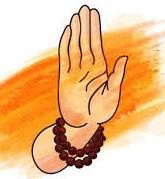
Tathastu is an ancient Sanskrit word meaning ‘So Be It’. It is a form of blessing from Gods. People prayed to Gods to have their wishes fulfilled. If the Gods were pleased, they granted them and said, ‘Tathastu – So Be It’.
It also has a deeper meaning that relates to Karma, efforts, and rewards. Actions have consequences. Mythology is symbolism. It is a powerful way to simplify complex concepts that are difficult to explain. Mythology creates beliefs, faith and conviction so people do what needs to be done to get to the end result. It is a shortcut, if you will.
What is Karma? Karma literally means action, or what one actually does. Good Karma means, you do good things, you live life in a way that doesn’t hurt others, and as a result you will find joy, peace and happiness.
The central message of Bhagavad Gita is when Lord Krishna says to Arjun, “you do your Karma faithfully and leave the results or reward to me”. This implies that good deeds result in good consequences. It may not always be so, but is a good practice. This concept applies to all the mundane work of life as well – do whatever you are charged with, perform your responsibilities honestly and diligently and you will be rewarded with the satisfaction of a job done well, as well as other rewards such as material wealth, love and respect from others, including your family, children and community.
More than anything else, the feeling that you get from a job well done, from within yourself, is an intrinsic reward itself.
What is happiness?
Happiness is a state of mind. What is mind? Mind is an abstract concept that relates to the functioning of our physical brain which weighs about three pounds in all adults. All our experiences, thoughts, feelings and perceptions are processed here that are influenced by specific triggers. These triggers fall in to four broad categories which I term Four Pillars of Happiness. Every person’s life is lived under these four pillars, and these pillars or triggers determine our sense of happiness, and impact the state of our mind. This is what this workshop is all about. You will learn to understand your own pillars of happiness.
We are all the same, yet completely different
All of us are made exactly the same, yet individually each one us is completely different from another, just as each individual has unique finger prints or DNA. Similarity is that everyone has similar looking fingers, but none two have the same finger prints.
What makes us different?
Life is a series of experiences – from the moment we are born and onwards. Each one of us is born to a certain person, in a certain place, in a certain family, country, religion, language, economic means, politics and a myriad of other factors. Each and all of these factors combined create our identity. That’s who we become and are trained and conditioned to believe. These factors are the ones that unite us as ‘groups’, or separate us from other ‘groups’ or identities.
Examples are national or religion identities. These large groups with common beliefs and identities go to war with other groups with different beliefs and identities. As it recently happened in WWII or many instances of one religion vs another, without specifying any one, particularly. We all know what it means.
We are conditioned to be something and someone over which we don’t have any control, at least in our formative years. Most of us live with these conditioned identities all our lives. But some of us begin to question these beliefs and identities created for us. Of these, some of us try to do something about it and change things. Come out of that whirl, if you will.
Then, what is common?
What is common is the four parameters in which each life is lived, the four pillars of happiness as I call it. There are certain constants in life, same for all of us. We know for a fact that the maximum lifespan for each one of us is 100 years, for those who go that far. A few may surpass even that, but so what! Therefore:
- Life is essentially, time.
- No one – rich or poor, can buy more time.
- Life is a series of experiences. Every moment is a different experience.
- Experiences, perceptions, and beliefs create states of mind, and happiness
- We CAN change our experiences, thus change our lives and state of our happiness.
- We certainly can make ourselves a LittleBitHappier
- Yes, We Can!